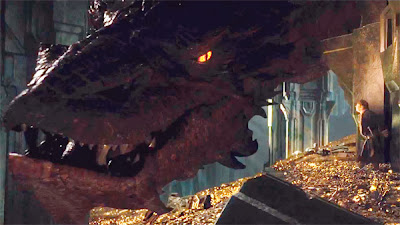 |
| Dragon meets hobbit (Martin Freeman) in Desolation of Smaug. |
«« The Hobbit: The
Desolation of Smaug. Written by
Fran Walsh, Philippa Boyens, Peter Jackson & Guillermo del Toro , based on
the novel by J.R.R. Tolkien. Directed by Peter Jackson. At area theaters.
According to the chronicles of Middle Earth, Bilbo Baggins' journey to Mt. Erebor takes place 3,063
years after the Fall of the kingdom of Númenor and 1,340 years after the foundation of the Shire.
These are eternities of time. Yet they feel like nothing compared to having to
sit through Peter Jackson's interminable trilogy of spectacles based on J.R.R.
Tolkien's The Hobbit.
The
problems with opus #2, The Desolation of
Smaug, are pretty much the same I described for #1 (An Unexpected Journey, 2012, see review here). This
is essentially a heist story—a caper wherein a band of semi-silly dwarves and
their hairy-footed companion attempt to steal a precious jewel from Smaug, an
avaricious dragon. Far from the sprawling, Manichean struggle of Lord of the Rings, events of The Hobbit were never meant to have cosmic
stakes. But instead of giving the story its own tone and look, Jackson adopts
the same portentous approach to he took for his Rings movies. He's like a
chef who serves the appetizer after the main dish, and finding you liked the
pasta sauce on the entrée, ladles it on your salad too.
And
then he repeats the mistake, in triplicate.
The new
trilogy at least benefits from another decade of development in CGI. The
set-piece for this episode, the encounter with the eponymous dragon, is
splendidly realized, with the giant sauropod appearing from beneath what looks
like a landfill of treasure. The beast is voiced by Benedict Cumberbatch, who
seems as ubiquitous as Sauron these days but characterizes him with all the
silky menace envisioned by Tolkien.
Strangely, the figure of Bilbo (Martin Freeman) seems lost here, as if Jackson, in 161 minutes of running time, couldn't find time for him. No surprise, considering that Jackson and his co-writers Fran Walsh, Philippa Boyens, and Guillermo del Toro are busy rationalizing the return of Legolas (Orlando Bloom), one of the most popular characters in the Rings movies. What Bloom (or his distaff sidekick Evangeline Lilly) are doing here is a mystery, given that they are neither in the book nor anything but peripheral to the script. It's a mystery, unless mowing down legions of hapless, disposable orcs is reason enough. (Wanna bet we'll see Viggo Mortensen in the next episode?)
Strangely, the figure of Bilbo (Martin Freeman) seems lost here, as if Jackson, in 161 minutes of running time, couldn't find time for him. No surprise, considering that Jackson and his co-writers Fran Walsh, Philippa Boyens, and Guillermo del Toro are busy rationalizing the return of Legolas (Orlando Bloom), one of the most popular characters in the Rings movies. What Bloom (or his distaff sidekick Evangeline Lilly) are doing here is a mystery, given that they are neither in the book nor anything but peripheral to the script. It's a mystery, unless mowing down legions of hapless, disposable orcs is reason enough. (Wanna bet we'll see Viggo Mortensen in the next episode?)
Jackson
also invests much time in the shoe-horning material presaging the return of the
bad guy, Sauron, from those other movies you saw already. It shouldn't be a
spoiler by now to reveal that Sauron will be defeated. So what's the point of
breaking the momentum from Bilbo's quest—which (for all we know) still hangs in
the balance—in favor of a battle for which we already know the outcome?
The
answer, of course, is that the question is irrelevant. The Hobbit is less a story now than the latest productions of a
media franchise that exists for no other sake than to keep going. Indeed, it's
a franchise in the same sense as Harry
Potter or The Olive Garden—an experience that fulfills certain expectations
regardless of whether they are "good" or "bad". Let the
critics carp, say the fans—we're off for the Middle Earth equivalent of
unlimited bread sticks.
@
2013 Nicholas Nicastro










